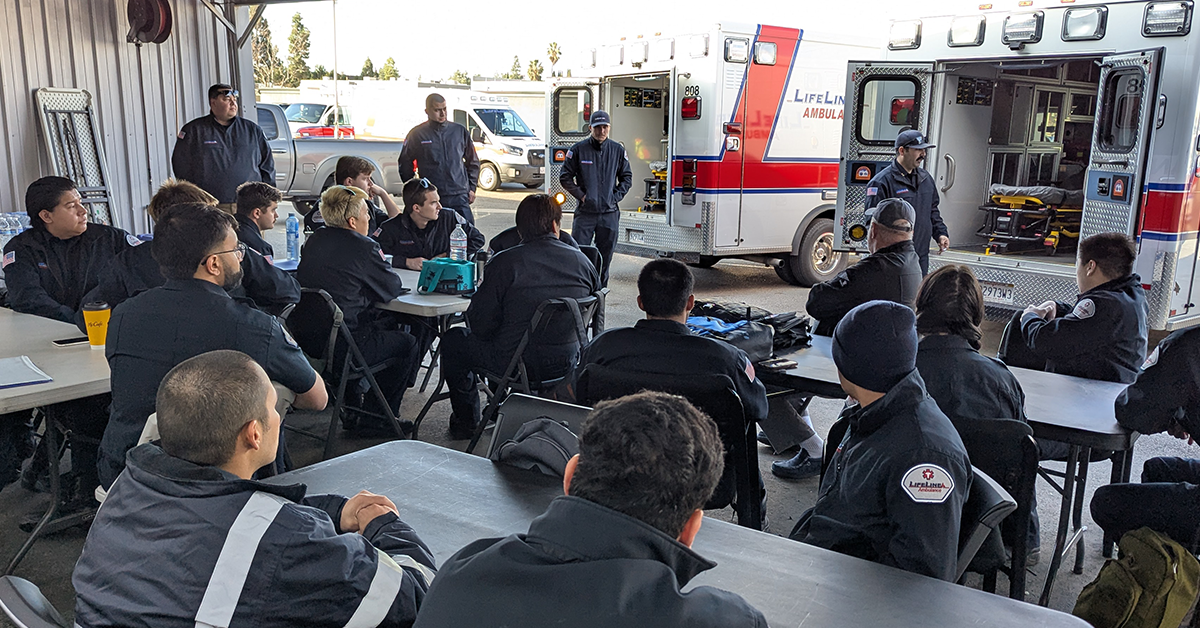A career as an Emergency Medical Technician (EMT) is both rewarding and challenging. While the role offers the opportunity to make a real difference in people’s lives, it also comes with unique stresses that can lead to burnout over time. To achieve career longevity and continue providing exceptional care, it’s crucial for EMTs to find ways to stay motivated and manage stress effectively. For those in Los Angeles and Southern California, LifeLine EMS offers insights and strategies to help EMTs maintain a fulfilling and sustainable career. This guide explores practical tips to avoid burnout and stay motivated in the demanding world of emergency medical services.
Understanding the Risk of Burnout in EMS
Burnout is a state of physical, emotional, and mental exhaustion caused by prolonged exposure to stress. In EMS, the high-intensity nature of the work, long hours, and frequent exposure to traumatic situations can contribute to burnout if not managed properly.
Key Factors Contributing to Burnout:
- Emotional Strain: EMTs often deal with distressing situations, such as severe injuries, life-threatening emergencies, and witnessing suffering, which can take an emotional toll over time.
- Physical Demands: The job involves physical exertion, including lifting patients, carrying heavy equipment, and working long shifts, which can lead to fatigue.
- Irregular Hours: The unpredictable nature of emergency calls means EMTs often work nights, weekends, and holidays, disrupting sleep patterns and personal life.
- High-Pressure Environment: Constantly working under pressure to provide immediate care and make quick decisions can lead to mental fatigue and stress.
Tips for Avoiding Burnout and Maintaining Career Longevity
To maintain a long and fulfilling career as an EMT, it’s essential to implement strategies that help manage stress and prevent burnout. Here are some effective tips for staying motivated and healthy:
1. Prioritize Self-Care
Self-care is a fundamental aspect of avoiding burnout and ensuring career longevity. Taking care of your physical, emotional, and mental well-being enables you to perform at your best and handle the demands of the job.
- Physical Health: Regular exercise, a balanced diet, and sufficient sleep are critical for maintaining physical health. Engage in activities that promote cardiovascular fitness, strength, and flexibility to handle the physical demands of the job.
- Mental Health: Practice mindfulness techniques, such as meditation or deep breathing exercises, to reduce stress and improve focus. Consider seeking professional support from a counselor or therapist if you experience ongoing stress or anxiety.
- Personal Time: Make time for activities you enjoy outside of work, such as hobbies, socializing with friends, or spending time in nature. Taking regular breaks and vacations is essential for recharging and avoiding burnout.
2. Develop a Strong Support Network
Having a strong support network is crucial for emotional resilience and motivation. Connecting with colleagues, family, and friends can provide a sense of belonging, reduce feelings of isolation, and offer valuable perspectives on the challenges you face.
- Build Relationships with Colleagues: Develop supportive relationships with coworkers who understand the unique challenges of the job. Regularly sharing experiences, venting frustrations, or seeking advice from peers can provide emotional relief.
- Seek Peer Support Programs: Participate in peer support programs that provide a safe space for discussing difficult calls, emotional challenges, and stress management techniques.
- Maintain Social Connections: Stay connected with family and friends outside of work to balance your professional and personal life. Social support can be a valuable source of encouragement and motivation.
3. Set Realistic Expectations
Setting realistic expectations about the demands of the job and your own performance is essential for avoiding burnout. Understand that you cannot control every situation and that doing your best is often enough.
- Accept Your Limits: Recognize that you cannot save every patient or control every outcome. Focus on providing the best care possible within the scope of your training and abilities.
- Celebrate Small Wins: Acknowledge and celebrate small successes, such as successfully managing a challenging call or receiving positive feedback from a patient. Recognizing achievements, no matter how small, can boost morale and motivation.
- Embrace Continuous Learning: View every call as a learning opportunity, and accept that mistakes can happen. Learn from experiences, seek feedback, and use each situation as a chance to improve.
4. Practice Effective Time Management
Efficient time management helps reduce stress and ensures you have time for both work and personal life. Managing your schedule effectively can prevent burnout and increase job satisfaction.
- Prioritize Tasks: Identify the most critical tasks and focus on completing them first. Delegate when possible and avoid taking on more than you can handle.
- Take Breaks: Use downtime between calls to rest, hydrate, and recharge. Short breaks can improve focus and reduce fatigue during long shifts.
- Maintain a Balanced Schedule: Whenever possible, try to maintain a balanced work schedule. Avoid consistently working overtime, and make sure you have enough time off to recover and rejuvenate.
5. Engage in Professional Development
Continuing education and professional growth can help keep you motivated and engaged in your career. Learning new skills, gaining certifications, and expanding your knowledge can open doors to new opportunities and prevent career stagnation.
- Pursue Advanced Certifications: Consider obtaining advanced certifications, such as Advanced Cardiac Life Support (ACLS) or Pediatric Advanced Life Support (PALS), to enhance your skills and knowledge.
- Attend Workshops and Conferences: Participating in workshops, seminars, and conferences can provide valuable learning experiences, networking opportunities, and exposure to new techniques and best practices.
- Seek Mentorship Opportunities: Engage with experienced EMS professionals who can provide guidance, support, and career advice. Mentors can help you navigate challenges and offer insights into career advancement.
6. Focus on the Bigger Picture
Maintaining perspective and focusing on the bigger picture can help you stay motivated and find meaning in your work. Remember the impact you have on people’s lives and the vital role you play in your community.
- Reflect on Your Purpose: Regularly remind yourself of why you chose a career in EMS. Reflecting on your reasons for becoming an EMT and the positive impact you have on others can reignite your passion for the job.
- Stay Engaged with the Community: Engage with the community through public health education, outreach programs, or volunteering. Building connections with those you serve can enhance job satisfaction and provide a deeper sense of purpose.
- Appreciate the Value of Your Work: Recognize that your role is essential to the healthcare system and public safety. Knowing that you are making a meaningful difference can provide motivation to keep going, even on challenging days.
7. Advocate for a Healthy Work Environment
A healthy work environment is critical for preventing burnout and promoting career longevity. Advocate for a supportive workplace that values employee well-being and encourages open communication.
- Encourage Open Dialogue: Promote an open dialogue with supervisors and colleagues about stress, workload, and job expectations. Sharing concerns and discussing potential solutions can help create a more supportive work culture.
- Participate in Wellness Programs: Take advantage of wellness programs offered by your employer, such as stress management workshops, fitness initiatives, or employee assistance programs.
- Promote Work-Life Balance: Advocate for policies that promote work-life balance, such as flexible scheduling, fair overtime practices, and adequate time off.
How LifeLine EMS Supports EMTs in Achieving Career Longevity
For EMTs in Los Angeles and Southern California, LifeLine EMS offers a supportive environment that prioritizes employee well-being and professional growth. Here’s how LifeLine EMS helps EMTs avoid burnout and stay motivated:
Comprehensive Training and Development
LifeLine EMS provides ongoing training and development opportunities to help EMTs enhance their skills, knowledge, and career prospects. Whether through advanced certifications, continuing education, or workshops, LifeLine EMS encourages professional growth and career satisfaction.
Emphasis on Employee Wellness
LifeLine EMS is committed to promoting employee wellness through a variety of programs and initiatives, such as stress management workshops, mental health support, and fitness activities. These programs help EMTs manage the physical and emotional demands of the job.
Supportive Work Environment
LifeLine EMS fosters a positive and inclusive work environment where open communication, teamwork, and mutual support are encouraged. The organization values employee feedback and strives to create a workplace culture that promotes well-being and job satisfaction.
Flexible Scheduling and Work-Life Balance
LifeLine EMS recognizes the importance of work-life balance and offers flexible scheduling options to help EMTs manage their professional and personal lives. Adequate time off, fair overtime practices, and opportunities for rest and relaxation are prioritized.
Keep Reading
Want more? Here are some other blog posts you might be interested in.
In the high-stakes world of emergency medical services, clear and effective communication can mean the difference between life and death. EMS professionals...
Emergency Medical Services is an ever-evolving field that requires constant learning and adaptation. With medical advancements, technological innovations, and increasing public health...
Emergency Medical Services s a high-stress, physically demanding profession that requires dedication, quick decision-making, and resilience. While the rewards of saving lives...






